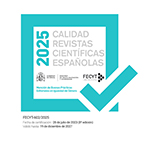El fútbol sin imágenes de fútbol. Innovar en la programación deportiva durante la crisis de los derechos audiovisuales: el caso de El Avispero de Aragón TV
Resumen
El artículo analiza el programa de Aragón TV El Avispero, considerado un caso relevante de innovación en la programación deportiva en un contexto caracterizado por la crisis de derechos deportivos y la difícil coyuntura económica que se dieron entre 2013 y 2016. Para ello, se emplean tres tipos de fuentes. En primer lugar, las bibliográficas y hemerográficas han servido para contextualizar el objeto de estudio. En segundo lugar, se usan fuentes documentales inéditas: la escaleta de una emisión representativa del programa, que plasma los contenidos, su jerarquía y enfoque, y las memorias anuales internas de la televisión pública aragonesa, que permiten analizar aspectos como, por ejemplo, los resultados de audiencia y su evolución. Por último, la realización de cinco entrevistas en profundidad a los máximos responsables de la cadena televisiva y del programa objeto de estudio constituye la principal fuente de esta investigación. Las conclusiones señalan que la creatividad fue clave a la hora de generar contenidos futbolísticos durante aquel periodo, manteniendo así la apuesta por los deportes, sin contar con imágenes. Una apuesta que se reveló exitosa, como demuestran los datos de audiencia y la continuidad de El Avispero en la parrilla durante varias temporadas. Se produjo así una transformación en la estrategia de programación deportiva de Aragón TV, que comenzó con la posibilidad de ofrecer contenidos premium durante sus primeros años y, por el contrario, tuvo que adaptar sus espacios a una situación de austeridad en las últimas temporadas de la primera década.
Descargas
Descarga artículo
Licencia
La revista Estudios sobre el Mensaje Periodístico, para fomentar el intercambio global del conocimiento, facilita el acceso sin restricciones a sus contenidos desde el momento de su publicación en la presente edición electrónica, y por eso es una revista de acceso abierto. Los originales publicados en esta revista son propiedad de la Universidad Complutense de Madrid y es obligatorio citar su procedencia en cualquier reproducción total o parcial. Todos los contenidos se distribuyen bajo una licencia de uso y distribución Creative Commons Reconocimiento 4.0 (CC BY 4.0). Esta circunstancia ha de hacerse constar expresamente de esta forma cuando sea necesario. Puede consultar la versión informativa y el texto legal de la licencia.










